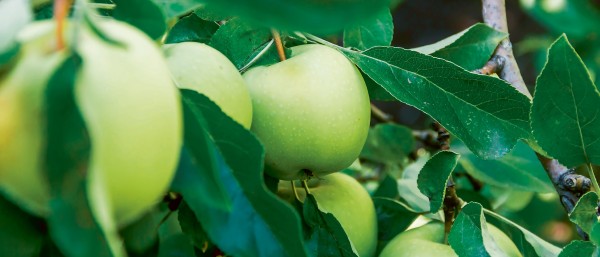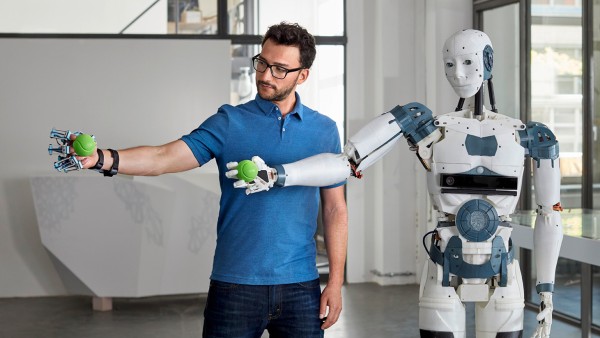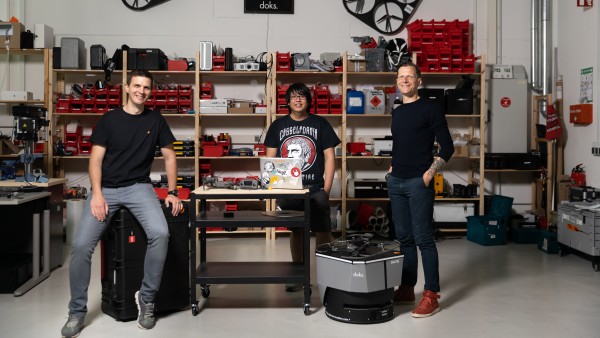Christina Ulardic, a partner at Belgian financial investor Astanor Ventures, on the food of the future, the importance of impact funds and cooperation with KfW.
About the Person

Since 2020, Christina Ulardic has been one of the five partners at Astanor Ventures. She previously led business development for innovative risk transfer solutions in the energy and agri-food sectors in the Middle East & Africa at Swiss Re Corporate Solutions – where she supported several start-ups involved in fintech and precision agriculture.
Ms Ulardic, on your website you write, “an apple is not an apple”. What is an apple for you?
Christina Ulardic:Basically, just a pome containing around 30 vitamins and trace elements including pectin, which reduces cholesterol levels and binds toxins in the body before flushing them out. However, it’s also a symbol of the positives and negatives of food production. If you work in my industry, you develop an awareness that nutritional content can vary hugely depending on the cultivation method and the supply chain, and that excessive use of pesticides can leave residues in fruit.
Is your USD 325 million fund a declaration of war on industrial agriculture?
No. I worked in Africa for many years, where smallholders cultivate their fields under difficult conditions and the crops are at risk from droughts and natural disasters. I don’t believe that we can feed the many people in urban centres without taking an industrial approach – whether that’s robots that enable automation, or using modern data analysis to enable better farming. The key question is how we can stop valuable ecosystems from being destroyed to make way for monocultures, or our soils from being polluted with heavy metals. This requires scalable approaches in order to promote biodiversity and enable CO2 to be stored in the soil.
In your portfolio you have more than 20 start-ups that are working on technological solutions relating to agriculture, food production and the oceans. What difference do you want to make compared to existing funds?
Astanor Ventures is an impact fund. This means that we select companies that not only have the potential to achieve commercial success, but that have the power and the desire to change things as well. The same applies to us as a fund. We want to change the sector and we only invest our money in start-ups that aim to have a positive impact on the environment, on society and on human health.
What exactly does that mean?
We look at food from “farm to fork”, so from production to the plate, which gives us a systemic view of production, value creation, delivery and the consumer. Companies that we invest in want to contribute to a sustainable food system. For example, they encourage less use of chemical products, drive the transition to more plant-based food or facilitate the financing of regenerative agriculture. We’re currently the largest specialist agri-food VC fund and we are investing both in Europe and in the USA. Due to the fund volume we are able to invest in companies very early, although we can also provide growth capital to support them.
To give us an overview of the bandwidth of your fund, what companies do you have in your portfolio?
Astanor Ventures has already invested in more than 20 start-ups in Europe and the USA. One example is the company Ynsect, which is currently building a huge insect farm in France. There is also Swiss start-up Vivent, which measures the electrochemical signals that plants send in connection with external and internal events – and by doing so could revolutionise how we handle plants. Or the British start-up Notpla, which uses seaweed to produce edible packaging.
How do you go about selecting the companies?
into strategic partnerships, bring talent into the business and commercialise the technology? Competitive advantage also plays a role: patents to protect the product, or the ability to operationalise and scale up in the early stages of a technology’s development. Furthermore, the company, the product or the idea must fit our strategy of promoting a sustainable food system.
What are your priority areas just now?
At the moment we’re focusing on plant-based products that can replace fish or meat. The approaches are really varied, from enzyme-controlled processes for manufacturing proteins, to laboratory-produced meat. Another trend is precision agriculture – like, for example, the integration of multi-faceted data into operational systems or the use of automated machines. Developments in synthetic biology are currently aimed at, among other things, producing functional materials without the use of animal products. Other major topics include decarbonisation, waste reduction, transparency in the value creation chain, “food as medicine” or “upcycling”.
Which priority area has the most potential in your view?
I think that in future we will probably see a mixture of solutions. At the moment, biotech solutions and growing crops indoors (“vertical farming”) are still fairly expensive outside of niche applications. However, the costs are decreasing rapidly. Another aspect is energy consumption. The climate crisis means that we need more renewable energy sources. In my view it would be great to see success in regenerative agriculture that deploys modern methods to use a lot of different organisms for products. As well as the apple described at the start, there are lots of ways to take in the necessary nutrients: for example, pulses like lupins as an alternative to soya. Or macroalgae, which absorb CO2 when they are growing in the sea and are excellent sources of vitamins, minerals and fibre.
Why do you believe that focusing on ESG criteria can achieve above-average results?
The demands placed on companies have changed. Today, consumers want to know where their food is coming from and whether companies are thinking about sustainability. Let’s take Deliveroo as an example of a company getting it wrong. The company just made its stock market debut. There were a few investors who publicly distanced themselves – due to the low wages Deliveroo pays and the bad treatment of their labour force. The share price fell by 20 per cent following the IPO.

Notpla
The British start-up Notpla produces edible packaging materials from seaweed.
Greenwashing: what can a fund really do about something like this?
When you put it like that, I can’t promise you that we’re going to change the world. However, I do think that we’re part of a movement that is thinking about how capital can be deployed to drive targeted innovations that solve ethical, health-related or environmental problems.
Astanor was founded in 2017 by Eric Archambeau and George Coelho. Was there an initial spark that prompted them to set up the fund?
One of our founders worked at Jamie Oliver’s Food Foundation and he learned a lot there about sugar consumption, nutrition and unhealthy eating. On top of that came the recognition that the technological revolutions that are needed in order to reduce carbon footprints had not yet come about in the agricultural sector. Actively working to improve this situation: that was the light bulb moment that led to the foundation of Astanor.
Who inspires you?
I personally find the entrepreneurs with whom we work hugely motivational. They are all convinced that their idea or their product will succeed. At the start, they have to take care of all of the technical, financial, commercial and HR aspects. They have to persuade investors like us that it’s possible to overcome all of the uncertainties about commercial success with a good strategy. Not all of them make it, not by a long shot: in the VC world it is highly likely that a company will need to go into liquidation.
Astanor
Astanor Ventures was established in Brussels in 2017. Today, the Belgian business employs a total of 15 people. Astanor invests in more than 20 start-ups relating to agriculture, food and the oceans.
What would be the most effective way to help start-ups?
Technological boundaries are receding very fast at the moment. Regulation doesn’t always keep pace. For example, it is really time-consuming to go through the “novel foods” process in the EU. This can mean that it takes longer for European companies to enter the market, putting them at a disadvantage compared to US competitors. And they still represent the benchmark for European businesses. It is considerably easier to attract venture capital in the USA.
What qualifications does your management team have to help them select the right companies?
We have a mixture of skills within the fund. The founding team has many years of experience in successfully setting up VC funds in the USA and in Europe, generating above-average returns. Naturally, we make use of our extensive knowledge around investment and of our networks. In the core team we also have technical knowledge and an understanding of business performance in general. Our advisers are specialists who, in turn, can call on additional experts. On top of that we have legal expertise, of course.
How important are public sector investors in the fund, such as KfW Capital?
As I have said, we see ourselves as an impact fund that values positive effects. When we were set up, that was something new. Even though our partners had been really successful in their professional careers, we weren’t yet able to provide performance data or demonstrate a track record for our new fund itself. Despite that, we received support from KfW. Institutional investors like KfW allow first-time teams to launch new funds with innovative approaches to investment, and to send important signals to other investors through their investments. Our large fund volume is an expression of that.
Where does Astanor want to be in ten years’ time?
On the one hand, we want to build a company that invests in more and more companies through follow-up funds and helps them with commercialisation. On the other, as a business we want to help develop knowledge and encourage the sharing of technological solutions with all stakeholders in society.
Published on KfW Stories: 28 June 2021





Data protection principles
If you click on one of the following icons, your data will be sent to the corresponding social network.
Privacy information